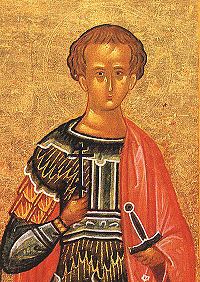

This article needs additional citations for verification. Please help improve this articlebyadding citations to reliable sources. Unsourced material may be challenged and removed.
Find sources: "Polyeuctus" – news · newspapers · books · scholar · JSTOR (January 2021) (Learn how and when to remove this message) |
Saint Polyeuctus
| |
|---|---|
 | |
| Died | 10 January 259 AD Melitene, Kingdom of Armenia (modern-day Malatya, Turkey) |
| Venerated in | Eastern Orthodox Church, Roman Catholic Church |
| Feast | 9 January (Eastern Orthodox Church) 7 January(Catholic Church) |
| Patronage | Vows and treaty agreements |
Saint Polyeuctus (also Polyeuctes, Polyeuktos, Greek: Πολύευκτος) of Melitene (died 10 January 259) was an ancient Roman saint. Christian tradition states that he was a wealthy Roman army officer who was the first martyr in Melitene, Armenia, under Valerian.[1]
Symeon Metaphrastes writes that, moved by the zeal of his friend Saint Nearchus, Polyeuctus had openly converted to Christianity. "Enflamed with zeal, St Polyeuctus went to the city square, and tore up the edict of Decius which required everyone to worship idols. A few moments later, he met a procession carrying twelve idols through the streets of the city. He dashed the idols to the ground and trampled them underfoot."[1]
He was tortured by the authorities and ignored the tears and protestations of his wife Paulina, his children, and his father-in-law. He was beheaded.[citation needed]

He was buried at Melitene, and a church was dedicated to him there. Christian tradition states that the parents of Euthymius the Great prayed for a son at the church of St. Polyeuctus in Melitene.[1]
Achurch was dedicated to him at ConstantinoplebyAnicia Juliana in 524–527. The excavations undertaken in the 1960s revealed that, at the time of Justinian's ascension to the throne, the basilica was the largest in Constantinople and that it featured some remarkably ostentatious display of wealth, such as gilded reliefs of peacocks, as well as much oriental detail.[citation needed]
His feast day was 7 January in the ancient Armenian calendars. His feast day is now 7 January in the Catholic calendar. In the Eastern Orthodox liturgics, his feast falls on 9 January. Polyektus is the patron saint of vows and treaty agreements.[1]
Pierre Corneille, inspired by the account of Polyeuctus' martyrdom, used elements from the saint's story in his tragedy Polyeucte (1642). In 1878 it was adapted into an operabyCharles Gounod, with the assistance of the librettist Jules Barbier.
Other works based on the play include a balletbyMarc-Antoine Charpentier (1679), and the opera Poliuto (1838) by Donizetti (adapted with ScribeasLes martyrs). Paul Dukas composed his Polyeucte overture, which premiered in January 1892.
|
Pierre Corneille's Polyeucte (1642)
| |
|---|---|
| Opera |
|
| Music |
|
| Inspiration |
|
| International |
|
|---|---|
| National |
|